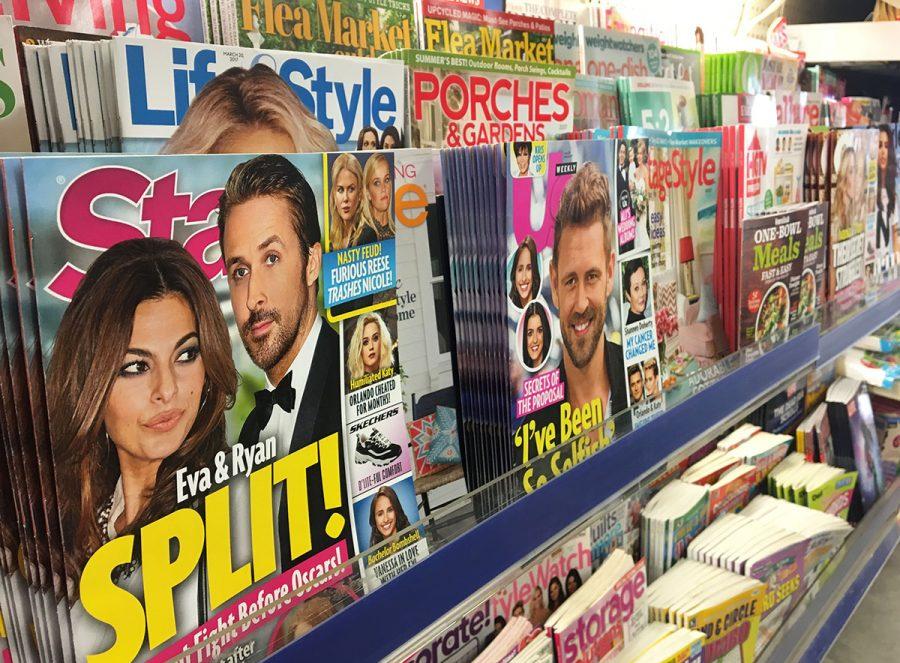The effects of following the famous and invading their privacy
Paparazzi and celebrity gossip magazines are going too far
More stories from Sydney Purpora
Photo by Sydney Purpora
Celebrity gossip magazines are following famous people too far by invading their privacy and painting their images in a false light for the public.
Staying updated on a famous person because you believe they are good at what they do and support them in their work is one thing; but nowadays, celebrities are being followed too closely, hurting their own as well as the consumers’ self-esteem.
Celebrities have been portrayed as God-like and above the “average” person by the paparazzi and celebrity gossip magazines because they are well known by the public.
For example, after a brief internet search for celebrity news, I clicked on E! Online, and one of the first articles I saw was titled “How to Nap Like a Celeb.” The piece goes on to explain “naptime is appropriate, always;” and while I do agree with that statement, the next paragraph left me shaking my head and rolling my eyes.
“So it’s only fitting on National Napping Day (yes it’s a real holiday) we pay tribute to the snooze fest-worthy must-haves of your favorite celebs.”
Not only is it unnecessary to “pay tribute” to celebrities for taking naps like a normal human being because they are indeed humans, it paints a picture for the public that celebrities aren’t ordinary people, but sometimes they do everyday activities that “ordinary people” do — like napping — and we should follow their example.
This imaginary construct of the hierarchy of celebrities being above the consumer wrong and is the cause of unrealistic standards for “ordinary people” to try to meet.
In addition, celebrities’ personal lives are exposed more than they should be. Because the public sees them as non-ordinary people, the entertainment press feeds off of that idea and uses it to put everything they do in the public’s eye.
There are some things we as viewers and consumers do not need to know when it comes to those whose profession includes public entertainment. One of the most well known cases of paparazzi taking it too far is when singer Britney Spears was first captured with a shaved head.
The incident occurred when Spears was walking on the street and paparazzi captured an image of her. Upon noticing the photograph was taken, she asked for some privacy, and when the photographer refused, she grabbed an umbrella and began attacking the person’s car.
During the time the photograph was taken, Spears was in between rehab and struggling with mental health issues. However, when the news of her baldness went viral in 2007, ABC News posted an article demeaning her as a person and said the public was wondering “What was she thinking?”
The work of the paparazzi in this instance didn’t share the whole story, and the public, instead of expressing concern for Spears during this time in her life, were more concerned with her baldness and how it changed what the ABC article calls the “pretty perky pop star’s” image.
Although this type of invasion of privacy is quite common among entertainment outlets, there are some news organizations that make sure to get all of the facts first.
An article written by The Associated Press in 2007 shed a new light on the issue and featured an interview with a psychiatrist named Gail Saltz. The article explains the struggles she was going through and how the depiction of her at the time was wrong.
“You know, for these celebrities, it’s really tough,” Saltz said. “They have no idea if anybody likes them for them … Everybody wants a piece. Everybody wants to make something off of her, her somewhere by her.”
Unfortunately, celebrities do have to live with the fact many people will go to great lengths to use their lives for personal gain; but it doesn’t have to stay that way.
There are news organizations out there, like the Wall Street Journal, the Washington Post and New York Times that make sure to accurately portray celebrities without crossing the line.
As consumers, we should recognize when coverage is taken too far and remember that celebrities are just like us and they do not deserve to be put under the microscope and studied.
We need to take control of the information we consume for our own sake and that of the news’ subject.

